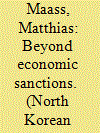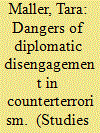| Srl | Item |
| 1 |
ID:
109215


|
|
|
|
|
| Publication |
2011.
|
| Summary/Abstract |
In 2010, Taiwan's president, Ma Ying-jeou, explained the rationale for his country signing a major economic cooperation treaty with mainland China with the following statement: "We can handle diplomatic isolation, but economic isolation is fatal." This essay will make the argument that in the case of North Korea, the opposite is true: Economic isolation appears fairly manageable for Pyongyang, but diplomatic sanctions may in fact enhance a broad coercive strategy significantly.
This argument will be framed within the broader claim that in particular in the case of North Korea, sanctions have been conceptualized too narrowly-they have been viewed as economic coercion only. Instead, the argument is made that sanctioning states should consider the entire spectrum allowed under Chapter VII, Article 41 of the UN Charter.
The discussion in this article will be limited to the case of North Korea for reasons of space and the urgent need to address the deteriorating security situation on the Korean Peninsula, given the country's rise to quasi-nuclear power status. In light of this development, the sanctions regime currently in place needs to be reevaluated. A reorientation towards diplomatic sanctions will allow for a broader coercive strategy that is mindful of nuclear deterrence but goes beyond economic sanctions, which have not been successful in restricting Pyongyang's military-strategic objectives.
|
|
|
|
|
|
|
|
|
|
|
|
|
|
|
|
| 2 |
ID:
089092


|
|
|
|
|
| Summary/Abstract |
This article assesses the utility of diplomatic sanctions in U.S. counterterrorism efforts. Through an examination of the United States' use of diplomatic sanctions in Afghanistan and Sudan in the 1990s, the article argues that diplomatic disengagement runs the danger of being more costly than beneficial. The blowback from diplomatic disengagement in counterterrorism includes, but is not limited to, the loss of valuable intelligence, a diminished public diplomacy capability, and the potential radicalization of moderates in the target regime. The article also highlights some of the general benefits of diplomatic engagement with problematic regimes and closes with recommendations aimed at enhancing the role of diplomacy in both counterterrorism and non-proliferation foreign policies.
|
|
|
|
|
|
|
|
|
|
|
|
|
|
|
|
| 3 |
ID:
097098


|
|
|
|
|
| Publication |
2010.
|
| Summary/Abstract |
The U.S. government has recently begun to emphasize the need for greater engagement with problem states. Proponents of this approach argue that diplomacy is necessary, even with these regimes. Critics, however, maintain that engagement with these regimes is tantamount to appeasement and signals acceptance of behavior that ought to be condemned. In their view, there is little to be gained by talking to these states. Thus, diplomatic sanctions-or sanctions characterized by political disengagement-are seen as a low-cost means of isolating and delegitimizing regimes.
|
|
|
|
|
|
|
|
|
|
|
|
|
|
|
|
| 4 |
ID:
118718


|
|
|